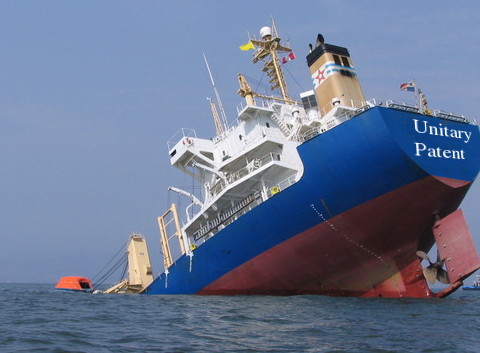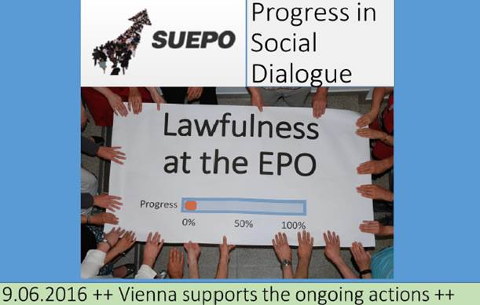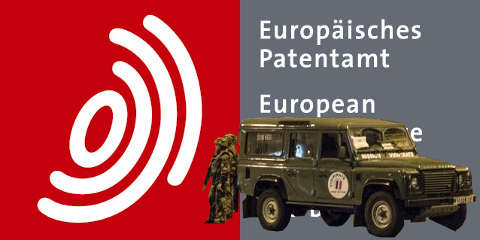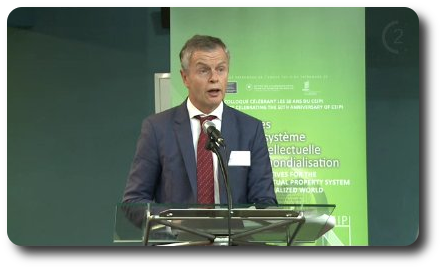Posted in Europe, Patents at 2:26 pm by Dr. Roy Schestowitz
What purpose is left for Battistelli at the EPO then?

Summary: The UPC continues to sink as more and more people come to grips with the complexity of the current situation, irrespective of what countries other than the UK do next
THE existential risk to the EPO (devaluation of patents) is no joking matter. It would severely harm Europe, more so than ‘Brexit’ has harmed Britain so far. One danger to the EPO is actually the UPC, which older rumours said Battistelli planned to jump ship to/for (moving to the UPC regime once it is created).
“Brexit Won’t Affect Current Patent Cases, But It Might Kill European Patent Court Plans” says one of the biggest publications for lawyers at Law.com. This headline is followed by the paragraph that reads: “The United Kingdom’s Brexit vote won’t disrupt current patent practice in Europe, practitioners said Friday, but it will surely cause further delays—and possibly even kill—plans for a unified European patent court.”
This basically agrees with what we have been saying for quite some time. In a sponsored “article” (they euphemistically call it “REPORT”) for the EPO/FTI Consulting-sponsored IAM there is UPC ‘damage control’ today. It comes from NLO, i.e. a bunch of lawyers from a self-serving firm. One must remember that the EPO itself foresaw the crisis in case 'Brexit' happens; what’s the point suddenly denying/downplaying the severity of the situation? Earlier today IP Kat wrote: “The Unitary Patent has been many years in the making, and its future is still not entirely clear. Dr. Ingve Björn Stjerna has published a series of papers on the subject, all of which are available to read along with links to other useful resources here. IPKat readers in particular may be interested in the “expert teams” of the Preparatory Committee, and the immediate implications for SMEs.”
“Basically, no simply resolution exists right now.”As Benjamin Henrion has just put it: “for the UPC, the ECJ stated it is not open to non-EU members.”
Jesper Lund added: “In the unlikely event CJEU will allow this, the post-Brexit UK would be subject to EU patent law and CJEU as highest court, right?”
Basically, no simply resolution exists right now. It’s more of a mess than it has ever been and it can take years for anything significant to happen (if it ever happens at all). People in IP Kat comments currently joke that the only way for the UPC to survive right now is for some large city in continental/central Europe to instantaneously rename itself “London”.
Earlier today one particular comment noted that “amending the UPCA to enable a Non-MS-UK to be part of the UPC would be anything but a simple task.”
To quote the whole comment:
Just had a flick through the UPCA and it strikes me as rather clear that amending the UPCA to enable a Non-MS-UK to be part of the UPC would be anything but a simple task. For example:
Art. 1: …”The Unified Patent Court shall be a court common to the Contracting Member States and thus subject to –> the same obligations under Union law as any national court of the Contracting Member State — ” (emphasis added).
Art. 5: Contractual liability of the court is largely governed by EU regulations
Art. 23: Reference to Art. 258, 259 and 260 TFEU
Art. 31: International jurisdiction to be established in accordance with Regulation 1215/2015 or the Lugano convention
Also, I note that whether or not the UPC will go live as planned in 2017 not only depends on whether the UK ratifies, but also on France’s and Germany’s ratification. Why should those two burden the already complicated Brexit-negotiations with additional issues and potentially give the UK extra leverage?
Here is another comment on the subject:
Before even bothering to try to wrap my mind around the legal complexities involved here, I’ll just say something: it is politically impossible. No British Parliament is going to ratify yet another European agreement, in the current mayhem, with MPs throwing things at each other and both parties effectively leaderless. And even when they regain some appearance of calm (if they ever do), they’ll have to deal with a lot many far more pressing concerns than the UPCA: not just trade, but also the millions of EU citizens in Britain and Britain citizens in the EU, their access to benefits and healthcare, and their pensions.
Not to mention the fact that this vote has whetted the appetite of quite a few other populists across the continent who dream to wreck the whole European project.
So, and I say this as somebody who has himself invested also quite a lot of time and effort in preparing for the UPC: Forget it. It’s over. This parrot is dead. It’s an ex-parrot. I hope that, some time in the future, maybe in less than yet another forty years, there’ll be a unified European (or EU) patent system. Maybe even, without the Cameron team’s fear of the CJEU, it will have a simpler, more rational legal structure than the UPC came to have. But for the moment, I’ll be happy if the EU still exists by 2020.
It seems as though Unitary Patent (and its predecessors) is a dead/dying project, based on what even some insiders who stand to gain from UPC publicly say. They should know this better than most people as it’s them who paved the way to the UPC, typically behind closed doors (or in very exclusive, seclusive and expensive meetings).
“EU software patents via the UPC,” as Henrion noted today, is a very big threat, but seems as though even patent lawyers are pretty much giving up on the UPC, rationally thinking that no ‘fix’ is possible amid ‘Brexit’. Joeri Beetz, whom we mentioned here before, published an article titled “Why a leaving UK will never join the UPC”. To quote:
For the greater part, all communication tells me more or less the same. The European Patent Office (EPO) is not an EU organization. British patent attorneys will continue to be able to represent their clients at the EPO and granted European patent applications can still be validated in the UK. When it comes to the future of the eagerly awaited, however not yet existing, pan-European Unitary Patent and Unified Patent Court (UPC), the communication becomes less clear. And for good reasons. No one really knows what is going to happen.
Still, when reading through all the articles that reached my various display screens, I was a little bit surprised by how many European IP professionals consider it a serious option for the Unitary Patent and the UPC to start before the UK actually leaves the EU and with the UK as a temporarily participating member state. Some of them (e.g. this article by the prominent Dutch IP Lawyer Wouter Pors) even went so far as to suggest that it might be possible that the UK would continue to participate in the UPC after having left the EU.
Earlier today we wrote about very long discussions regarding this sensitive matter. It was about trying to bring back the UPC, albeit every discussion was full of pro-UPC people, i.e. probably a bunch of discussions from those who would gain from it (if it ever became a reality at all). Now comes an antagonist to the echo chamber and says: “Stop, stop, stop, all of you, please stop. [...] It’s over. I repeat, it’s over.”
Here is the comment in full:
Stop, stop, stop, all of you, please stop.
It’s over. I repeat, it’s over. The conversations in the legal community over the course of the last few days, in which lawyers are desperately trying to put sticky tape on the house of cards to prevent it from falling down, are not going to work.
Any system has to be palatable to industry, whether telecoms, mechanical, automotive, pharma, or SME. Even before Brexit, the whole thing was looking a bit wobbly (and hence creative lawyers were licking their lips for working out ingenious ways in which the system could be gamed).
But now, forget it.
Having mentioned Tilmann this morning, it’s back again and he’s everywhere in the discussions. Tilmann’s UPC fantasies (he is one of the core people pushing for it, for personal gain obviously) are brought up again as follows:
This proposal from Prof. Tilmann may be reflective of what is going wrong in th EU, and why the situation is now as it is. There was a democratic decision by the UK to leave the EU. It was narrow, it was not to everybody’s taste (also not mine, to be clear) – but it was a democratic decision that the UK should distance itself from the EU. We have to respect this decision, or else we would jeopardise our democratic fundament.
Now advocating that the UK should nevertheless ratify an agreement which would connect it with the EU does not appear to be appropriate. It appears to be an attempt to undermine the result of the referendum.
As far as I remember, nobody ever made similar suggestions to enable the participation of other non-EU countries like, say, Norway or Switzerland. I thought there were good reasons for that (CJECU opinion 1/09). Suddenly, all this does not appear to be valid any longer? This does not sound convincing.
In my personal view, the UPC without the UK would be much less valuable. Therefore, the UPC should now be revised to reflect the new scenario. I fully understand the disappointment of all people who spent huge efforts to establish this agreement, but this is not a valid reason to disregard the outcome of a democratic referendum.
“A quite interesting and imaginative intellectual exercise by Prof. Tilmann,” wrote this person in response, “an exercise inspired by his restless efforts to promote the unitary patent system. But it seems to be far from reality. Leaving aside the objections derived from the ECJ’s conditions in its opinion G 1/09 for a Court competent to decide on EU law, Mr Juncker and Mrs Merkel have made it quite clear yesterday that there will be no cherry picking for the UK and that negotiations on the relations EU – UK have to take place after implementing the BREXIT.”
“Prof. Tilmann cannot be taken seriously,” explains another person, as “his “expert” statements usually do nothing more than serving his very own interests, as some commentators have quite rightly indicated.”
Here is the full comment:
I am very sorry, but Prof. Tilmann cannot be taken seriously, his “expert” statements usually do nothing more than serving his very own interests, as some commentators have quite rightly indicated.
Readers may wish to have a look at Prof. Tilmann’s past writings on opinion 1/09, some are freely avalable on the internet (e. g. EUCJ – Opinion 01/09 – Analysis and Consequences, www.eplawpatentblog.com/eplaw/2011/04/eucj-opinion-0109-analysis-and-consequences.html). Studying paragraphs 14, 15, 19, 22, 23 of said paper is very enlightening, also Prof. Tilmann’s conclusions (paras. 24 and 25):
“24. This leads me to the following result of my Analysis: If the Agreement would be
concluded by EU Member States only and if the two “sanctions” would be expressly regulated in the Agreement, the Court would not have objections against the centralised Patent Court (PC).
25. Therefore, I advocate that the Opinion of the EUCJ be adopted to the fullest
extent and accordingly that the draft Agreement be amended in the following respects:
a) restricting the membership of the Agreement to the EU Member States willing to participate in the Enhanced Cooperation on the Unitary Patent and (…)”
So is it only my understanding that Prof. Tilmann was in fact saying in his analysis of opinion 1/09 that participation in the UPCA should be limited to EU member states only?
To the informed observer, Prof. Tilmann’s remarkable flexibilty in his positions on the UP/UPC issues is nothing new, he has repeatedly morphed in line with what was required to realize the project:
In the context of former Art. 6 to 8 of the Patent Regulation, some may remember that Prof. Tilmann first argued that the articles could not be removed without putting at risk Art. 118(1) TFEU as the Regulation’s legal basis. Later, after the European Council had demanded the removal of these articles, he suddenly advocated for the exact opposite of his initial position, namely that a removal was perfectly legal and would not endanger the legal basis at all.
Some may also recollect that he held the position that the opt-out of an eligible patent from the jurisdiction of the UPC would leave the application of the UPCA unaffected, i. e. a national court dealing with an opted-out patent would have to apply the UPCA in the national proceedings. This even led the Preparatory Committee to issue a statement that it did not share this position (www.unified-patent-court.org/news/interpretative-note-%E2%80%93-consequences-application-article-83-upca).
Therefore, Prof. Tilmann’s statements should certainly be taken with nothing but a grain of salt.
Still focusing on Tilmann’s role in the whole UPC project:
Professor Tilmann’s paper is certainly interesting and he may (or may not) be correct in his proposition that the UK can be part of the UP and UPC.
However, as already stated, even if this could happen it should not happen.
I suspect that even staunch supporters of Remain (including myself) would agree that a problem with the EU is that it has (by stealth?) over the years moved from an economic union towards a political union. Consequently I assume that many Remainers object to laws originating from the EU Commission having effect in the UK and even they would agree that we are perfectly capable of making our own laws in the UK and don’t need the EU to do it for us.
Since it is the courts who enforce the law and since the UP and UPC dictate which courts have jurisdiction it would be diametrically opposed to the spirit of the Referendum result to give courts in mainland EU countries jurisdiction over patent matters in the UK.
However much we as a profession (both in the UK and the rest of the EU) would like the UP/C to be effective in the UK, we should face up to the fact that it shouldn’t happen.
A relatively rude comment then said that “big Anglo-American law practices want to keep England in the UPC.” Well, obviously, but not just Anglo-American ones. The whole UPC scheme isn’t a national conspiracy but an occupational conspiracy, i.e. a collection of patent lawyers trying to make their wishlist a reality. They have spent many years trying to accomplish this and many of their hopes and dreams come crashing down right now.
“The mind boggles as to how anyone could thing the UPC is one of the things the UK could seek to cherry pick,” this one person wrote. “Seriously?”
Well, that’s actually a good point and there are more urgent goals for the UK if/when it exits the EU, not some ineligible scrolls with patent screed that was dubious along. Here is another opinion on the matter:
Honestly, stop thinking about it.
Just because there might be some “legal theoretical” ways to “fix” it, it’s never going to happen.
The “Eastern District of Texas” argument is good to kill the treaty for good. Why should IT, ES (or DE and FR) go for something like that? Iurisdiction outside it’s own iurisdiction?!
EMA and other institutions are moving out of London and the UPC people dream of opening a new EU institution in London or having English judges deciding on cases under EU law?!
Even minor points are big for some countries: Why should English be the sole language of the procedings? Only Ireland would be an English speaking member. Spain and Italy won’t like it nor will France or Germany…
Some people were paid very well for the last few years and now cling to their jobs and “mission”.
So everybody go on and do something “useful”.
“There are many tragedies connected with Brexit,” the following comment says, and “the likely demise of the UPC being one of the lesser ones.” This is yet another reason why the UPC might be a dead-end project. Remember that London is still considered the capital of litigation or at least of lawyers.
To quote the entire comment:
There are many tragedies connected with Brexit (and the debate that preceded the vote), the likely demise of the UPC being one of the lesser ones. Nevertheless, one still has to feel for those who have put their heart and soul into bringing the UPC into being. It is not hard to understand that they do not want to see all of that time, effort, energy, cost and resources amounting to nothing more than a hill of beans. I think that I would feel the same in their shoes.
If Brexit does become a reality, then we will have gone backwards with regard to the goal of simplifying and reducing the costs of securing and/or enforcing patents across multiple European countries. However, that does not mean that we should get too disheartened. I’m sure that the UPC did not look all that appealing to SMEs. Further, the glaring (loop)holes in the legislation leave a lot to be desired, and would / will create a huge amount of uncertainty. Thus, we should perhaps not spend too much time mourning (or making what are likely to end up being futile attempts to prevent) the UPC’s imminent demise, and instead focus our creative energies on constructing something new that could end up being better.
I shall provide the first idea: how about a “mutual recognition” system for court judgements? This could perhaps involve conducting full litigation in one jurisdiction and then having only “litigation light” in the jurisdictions where the judgement is to be recognised (e.g. where the fact-finding and expert evidence is taken from the first judgement, but where differences of fact and national law in the jurisdiction of the other court(s) are taken into account).
Such a system might not be optimal. However, combined with further efforts to reduce the cost of validation (e.g. based upon efforts made with machine translations and/or rules taken from the UPC regarding provision of a translation upon enforcement) it might represent a compromise with which we could all live for many years to come. If you cast your eyes back to what happened with the CPC, you will see that the EPC represents a very similar kind of compromise.
“The UK will not ratify anything that will give jurisdiction on an important part of IP law to an EU body while it is negotiating to remove itself from jurisdiction of EU bodies,” notes the following comment. Here is the full comment, which just like many others is rather pessimistic about the entire thing.
A creative solution, which requires everyone to co-operate and trust one another from the word go.
In the current climate, that is wishful thinking.
The UK will not ratify anything that will give jurisdiction on an important part of IP law to an EU body while it is negotiating to remove itself from jurisdiction of EU bodies. If it did so, it would have to be in the knowledge that that jurisdiction may return to the UK after two years. In the meantime, there would be the risk of British headlines about injunctions by brand new EU courts against UK small businesses or importers, which would play into isolationist hands, all the while the UK is trying to create a workable, amicable exit package. The UK will also not hand over its bargaining chips so easily. If it is a benefit to the EU that the UK participate in the new Package, then expect this to be a negotiating point between UK and rEU, not a done deal.
The UK’s involvement in the Package is therefore likely to be deferred until the Brexit agreement is made, or until the political winds change. Therefore, the package also would likely be deferred.
As was made well above, the problems created by Brexit are not solely legal, but are also political, and the creative solution posed misses the political dimension.
We expect some rename or some alternation of strategies from the UPC camp (Bristows might actually have to rebrand and register a new domain). But that doesn’t mean that anything like the UPC will ever become a reality. It’s the single thing that I can think of which ‘Brexit’ would be good for. █
Permalink
 Send this to a friend
Send this to a friend
Posted in Europe, Patents at 1:33 pm by Dr. Roy Schestowitz
Unless lawfulness is restored, the EPO will sink fiscally and perish

Summary: Battistelli’s EPO is having not only reputation problems but also staff retention problems, patent quality problems and problems pertaining to perception of fair trials or justice regarding patents
MULTI-BILLION or even small companies regularly pursue patents (e.g. granted by the EPO) in order to be able to follow a potebntially lengthy legal process and collect fees, unless an agreement is reached or settlement is arranged outside the courtroom (usually when there’s little doubt about the potency of the said patent/s). But what happens when the EPO itself stomps on its own staff (examiners) and spits at the face of legal processes? What happens when the examination process itself is dubious (likely to be discovered only at the court when astronomical fees are spent on prosecution lawyers)? These are very important questions that every single EPO worker must consider in light of decline in patent quality and demolition of the appeals process. Watch this morning’s tweet from the EPO. It gives the illusion of outside input being taken seriously (“Want to submit third-party observations? Our online form will help you do so concisely”). It would probably be a total waste of one’s time now that Battistelli rushes EPO examiners to just grant (lax/inexistent prior art searches) and crushes the appeal judges.
The circle of Battistelli, or Team Battistelli as we like to call it, is still attacking judges. What message does that send to stakeholders who process, prepare, submit and get granted patents? As this one comment put it today, “hope that the AC [Administrative Council] realises that thanks to its recent reforms it can now suspend the President” (he regularly breaks his own rules). Here is the full comment:
Let us hope that the AC realises that thanks to its recent reforms it can now suspend the President for up to two years pending an independent investigation into the reign of terror which he and his cronies have been conducting against EPO staff.
I am sure that they will take whatever action is necessary to restore order at the EPO.
Here is a response to an earlier comment:
“If next time they will be able to hold proceedings in public and hear the witnesses of the IU, there should be no reason why they will not be able issue a decision on the merit of the accusations.
…
Why do you think that their decision precludes another attempt by the AC – i.e., Battistelli?”
Do you seriously think that BB [Battistelli] is going to tolerate a public hearing and the questioning of witnesses which might expose the misdeeds of “his” investigative unit ?
Yes, as we noted here before, there seems to be an element of fabrication and/or exaggeration, just like in Laurent Prunier's case (SUEPO The Hague).
Here is another comment on this matter (Battistelli’s abuse of legal processes):
the whole of the introductory part might be interesting too
it reads (with one word omitted) in English: When, …, do you mean to cease abusing our patience? How long is that madness of yours still to mock us? When is there to be an end of that unbridled audacity of yours, swaggering about as it does now?
to whom might that apply ?
And from another thread we have this comparison to Juncker:
President Juncker has now officially stated that when Britain appoints a new Prime Minister they must invoke Article 50 within 24 hours if they are part of the ‘leave’ campaign, or 2 weeks if they are part of the ‘remain’ campaign.
I cannot find the legal basis for this in the EU Treaty. It is certainly not mentioned in Article 50. Can someone point to the legal basis for this demand?
There must be a legal basis, otherwise President Juncker is making up EU law himself, which is the act of a dictator.
What do the EPO employees who have suffered under the rule of Battistelli think of this?
The context of this is actually ‘Brexit’ — a subject that we shall tackle separately later.
“”Liberation” turns on Battistelli,” wrote another commenter about a new article whose translation we still hope to get from someone. Any volunteers? Sooner or later SUEPO itself might provide a translation, as most of the article is about SUEPO.
The EPO will sink or swim based on its reputation. At the moment Battistelli and his ‘bulldog’ are probably the top liabilities. One might get arrested, but the other needs to step down or get sacked. █
Permalink
 Send this to a friend
Send this to a friend
Posted in Europe, Patents at 12:47 pm by Dr. Roy Schestowitz
It’s Team Battistelli that creates and fosters a militant/militaristic atmosphere, not the remainder of the staff, which is civil, well-educated, and demonstrably peaceful

Georg Hegel-inspired methods: Manufacturing a crisis or evoking external crises to offer the “solution” and keep staff scared, divided, isolated, marginalised
Summary: “As if Laurent were a terrorist, the Office has imposed a house arrest and has forbidden him to enter the EPO premises,” according to SUEPO, writing about one of its members at The Hague who is “maliciously accused via a fabricated procedure”
THE EPO never ceases to amaze. It’s a good thing (for Battistelli at least) that there was a terror attack less than a day before the Administrative Council’s meeting because it was so predictable that Battistelli would milk this terror attack today (warning: epo.org link). Quite frankly as usual (recall what he did after the attack in Orlando). Sometimes it’s a blog post, sometimes an open letter, and this time a “news” item that just quotes/relays Battistelli, who is very far away from Turkey (unlike Paris where he actually spent a long time). Battistelli fancies himself an omnipotent King and it’s supposed to be fine “because terrorism”. That’s exactly the same behaviour or rationalisation as Erdoğan’s (whom we habitually compare Battistelli to).
This brings us to the latest person in Battistelli’s firing line (there are several more whose stories we will tell). Some big things happen at the EPO today, so not many people are likely to pay attention to yet more alleged fabrications by Team Battistelli.
SUEPO Central’s publication on Laurent Prunier’s suspension was disseminated earlier today. In it, SUEPO The Hague highlights the shift from terror in Munich over to The Hague. The reign of terror is one that cannot be escaped as it transcends national borders (not just to Berlin, i.e. not just site/city non-borders), in spite of the wrath of Dutch courts, Dutch politicians, and Dutch media. Here is SUEPO’s message:
Laurent Prunier suspended, pending dismissal
Dear SUEPO members, dear colleagues,
Battistelli is not only staring into the abyss1. He has taken a big step forward. After more than a decade of heavy involvement in SUEPO and staff representation, Laurent Prunier (current Secretary of SUEPO TH), has been suspended in the evening of 27/06/2016, pending dismissal. We refer to the article of NRC published on 29 June: “Vakbond wil opheffing immuniteit Battistelli”2.
As if Laurent were a terrorist, the Office has imposed a house arrest and has forbidden him to enter the EPO premises “to protect the victim and witnesses as well as the integrity of the procedure”. What a farce – the grotesqueness would be funny if Laurent were not sick after having been tormented for months.
Laurent cannot share with us the details of the accusations, but he says the investigation procedure is demonstrably malicious, and the accusations fabricated.
Also the timing of the suspension is suspect: less than two days before the Administrative Council meeting, and a few days after SUEPO has filed an injunction (kort geding) to complain about the intolerable union harassment SUEPO officials have been facing for too long. We can already hear VP1 proclaiming “purely coincidental” …
Enough is enough. We have instructed our lawyer to work towards the lifting of Battistelli’s immunity and of course we will keep you posted.
Please keep supporting us, and Laurent.
Yours,
SUEPO Central
______
1 https://suepo.org/is_battistelli_staring_into_the_abyss/d-43465
2 http://www.nrc.nl/next/2016/06/29/vakbond-wil-opheffing-immuniteit-battistelli-2964865
This matters to every single EPO worker because if Battistelli and his goons can do this to Laurent Prunier, then they can do this to anyone whom the President (or “King”) picks because of envy, fear, senseless paranoia or whatever.
As a little bit of background, Laurent Prunier is Secretary of SUEPO The Hague. It’s said that he “was already placed abusively on unauthorised absence for the past 6 months although being sick” and “has now been officially suspended [as of] two days ago. Laurent is maliciously accused via a fabricated procedure and he risks dismissal.”
Sounds familiar? Well, fabricated procedures wouldn’t be news at the EPO as this was already done against a judge who already enjoys (in principle) independence from Battistelli’s long arm and short temper. “After the dismissal of two SUEPO officials and the severe degradation of another one in Munich early January,” we learned, “Laurent is thus a new target of the Battistelli’s regime. Other SUEPO officials in The Hague too are in the line of fire, not to mention all staff who suffer from toxic working conditions.”
No wonder there’s brain drain, even at the very top. █
Permalink
 Send this to a friend
Send this to a friend
Posted in Europe, Patents, Rumour at 12:00 pm by Dr. Roy Schestowitz

Summary: Dr. Christoph Ernst is claimed to be the successor (interim or permanent) of the notorious Battistelli, but these claims have little or no evidence to support them
THE EPO‘s President should get sacked this week, but he attacks anyone who gets close to even suggesting so. For quite some time now people have hypothesised that Christoph Ernst would replace Battistelli and Tilman Müller-Stoy’s letter to Ernst a few days ago brought these hypotheses back to life.
Some rumours today (coinciding with the meeting of the Administrative Council and the protest in Munich) suggest that Battistelli effectively got fired. We heard those rumours and there is even a comment about it. As it is just a rumour for now we have said nothing about it and fast-checked instead. “Latest rumour from the EPO,” as one person put it, is that in order “to avoid any further harm to the institution the CA envisages to discharge BB [Battistelli] of his duties in respect of the boards, with immediate effect. M. Ernst the German representative will act ad interim. Too smart to be true?”
“Some rumours today (coinciding with the meeting of the Administrative Council and the protest in Munich) suggest that Battistelli effectively got fired.”It would be smart, yes, but it sounds unlikely to be true and all the responses to this comment are jokes, e.g. one about Battistelli being interim replacement for Ernst and this one which says: “An ad libitum [Latin for “at one’s pleasure”] President replaced by an ad interim President?”
Another said “You mean: A partial dismissal? (Is that like a partial pregnancy?) A president for the EPO, and a separate president for the BoA? The separation achieved by a mere vote of the AC?”
That can never happen of course. Here is a hypothetical humorous scenario:
Too smart to be true? Really?
[Enter two delegates of the AC]
[First delegate] Let’s stop the kid from entering the glass department – he can still play wrecking ball in the other departments …
[Second delegate] You are right, this way we don’t have to deal with his temper tantrums …
[Exit delegates]
Whatever happened today at the meeting will probably become public knowledge pretty soon. The rumour about Battistelli getting (in effect) fired may be baseless, based on private sources and also this comment which not too long ago said: “According to discreet contacts, the rumour is now that the above rumour on stripping BB of his powers over the BoA is nothing but a canard.”
“Well, with one day remaining for the meetings/sessions there is still time to contact the national delegates (they can read E-mail whilst away) and tell them why dismissal of Battistelli is crucial for saving the entire Organisation.”Rather than celebrate something that has not happened (at least not yet) let us look at new reports like this one (“Russian IP Industry At Center Of Massive Scandal” from IP Watch). This sounds eerily similar to things we heard about DZIV and SIPO under leadership of the EPO Vice-President who now faces many criminal charges in Croatia. The article is behind a paywall, so it’s hard to say what exactly the similarities may be…
As another scandal du jour, it seems apparent that some commenters at IP Kat read Techrights and one of them made a joke about the Dutch press report, which we translated before noon. “What a nice image of the European Patent Office,” said the commenter, “the Bailiff, a public official of the Netherlands, escorted off the premises of the Office by five guards without even being told where the mailbox is…
“But hey! if it is all fine with the Dutch delegation in the AC, why should everybody else complain, right?”
Well, with one day remaining for the meetings/sessions there is still time to contact the national delegates (they can read E-mail whilst away) and tell them why dismissal of Battistelli is crucial for saving the entire Organisation. Not only the survival of the Office is at stake and delegates certainly don’t want to be left out of their job. Some of them would have to — gasp — start paying dentists. █
Permalink
 Send this to a friend
Send this to a friend
Posted in Europe, Patents at 5:57 am by Dr. Roy Schestowitz
What was once illegal (abuse of animals for entertainment purposes) is acceptable under Battistelli, who treats his workers like few people even treat animals

Summary: Battistelli’s attack on justice and on the rule of law is debated among insiders who have grown increasingly impatient with the Administrative Council’s tolerance of Battistelli and sometimes even Kongstad’s amazing complicity
A terrified and/or complicit Administrative Council has been persuaded by the Office to break the rules and help break the law. This is Battistelli’s truly ugly legacy at the EPO (the Administrative Council ought to sack Battistelli, but it looks as though financial strings now exist to prevent this).
To make matters worse, as we first noted last year, the Administrative Council has itself done things which are against the rules, so maybe it too should be sacked. Its Chairman, Mr. Kongstad, helps hide Battistelli’s contracts and he continues (through inaction) to protect the thug/ringleader with his Secret Service. The EPO is now indistinguishable from state-sponsored Mafia or vigilantes, where the state is the equivalent of the Administrative Council (unwilling to step in to intervene or put an end to gross injustices).
“The EPO is now indistinguishable from state-sponsored Mafia or vigilantes, where the state is the equivalent of the Administrative Council (unwilling to step in to intervene or put an end to gross injustices).”Today the Administrative Council is meeting and right now there is a protest by staff (the weather in Munich seems acceptable for a change). They have so much to be angry about and Battistelli has so much to be punished for (if his immunity gets removed as it ought to). He is breaking even his own rules at every turn.
The one truly interesting discussion at IP Kat right now revolves around the leaked decision (we even translated the whole thing into Spanish — all 33 pages of it). To quote one new comment:
So let me get this right. You are suggesting that the ability of the President of the EPO to initiate disciplinary proceedings and/or impose a “house ban” against a member of a BoA (which was the basis of the EBoA perceiving the President’s letter as a “threat”) means that the BoAs are not “independent” from the rest of the Office.
Have I understood that correctly? If so, are you not talking more about a perception of independence? I would rather have thought that the EBoA rather demonstrated their independence in this case, by not taking the decision that the President so clearly wanted.
Of course, the point about perception of independence is an important one to address, and so I would suggest that it is essential that the procedure for removing a member of the BoA is changed (again) to eliminate all possible influence of the President of the Office on the process.
The “EPO President once more obstructs justice,” wrote one person, “and fails to inform the AC” (Administrative Council).
Is this a sackable offense? Does Konstag have the sack (pardon the vulgar pun) to do something about it? He privately (discreetly) complained about Battistelli a few months ago, but nothing came out of it. Here is another comment on the subject:
Headache old chap it might be that the construction noise is befuddling one’s brain ?
Unless I am very much mistaken the term “judicial review” when used in an international treaty like TRIPS means the review of an administrative or other decision by a judicial instance.
https://en.wikipedia.org/wiki/Judicial_review
A “judicial instance” is commonly understood to refer to a tribunal which is independent of interference by other branches in particular the executive.
If the BoA are not free from interference by the executive then arguably they no longer comply with the TRIPS requirement.
Compliance with TRIPS is not the EPO’s problem.
But it could be a problem for the member states.
If you can’t or don’t want to understand that I suggest that you concentrate your mind on trying to fulfill your five-year plan targets and leave such issues to others. Just don’t blame me when your government is sued by the US or some other non-European state for breach of TRIPS.
Here is a reply to this:
Where does TRIPS limit itself to states having the judicial powers independent? It is NOT a requirement, however much we westerners want that to be…. See Poland, as example….
Also:
Compliance with TRIPS is not the EPO’s problem.
But it could be a problem for the member states.
Do the member states care, if they do not even care for breaches of the ECHR?
“It says “judicial”, not independent,” one person pointed out. “But by arguing that the BoA are not judges, King B. argues himself that the requirements of Art. 32 TRIPS are not fulfilled. One may ask why? Doesn’t he realise the implications or doesn’t he care at all?”
Unless Battistelli is indeed a “King”, action against him is well overdue. “Meanwhile,” one person wrote, “it appears that SUEPO is attempting to take the EPO to court again in the Netherlands. When can we expect a decision in the already-existing Dutch legal proceedings?”
As Battistelli and his minion (Minnoye) refuse to obey orders from even the highest Dutch court, where might this lead?
“Let´s not care about independent justice,” one person wrote, “but instead let us spend the applicants fees having nice and glamorous little events” (this refers to EIA and yesterday’s tweet from the EPO makes it clear that Battistelli wants to flush several more millions of Euros down the toilet, having begun preparations for another expensive charade, EIA 2017).
Under Battistelli, as this one person noted, “by no means can it be concluded that under such circumstances the EBoA is independent.” Here is the comment in full:
“I would rather have thought that the EBoA rather demonstrated their independence in this case, by not taking the decision that the President so clearly wanted.”
The EBoA apparently was forced to terminate the proceedings because their envisaged course brought a threat upon them.
Termination of the proceedings and not taking a decision on the substantive merits was the only option because both, an “unlawful” and a “lawful” decision in any case would have been vitiated (items 44-46 of the decision).
This, in my view, cannot be called “independent”.
Following your suggestion in principle the EBoA´s proceedings could always be forced to be terminated without issuing a decision on substantive merits merely by threatening the Board´s members.
Such a decision (termination of the proceedings), however, would be the direct result of the threat. Since the threat can be brought upon the members at will of the threatening party such an outcome of the proceedings (termination of the proceedings) could be brought about by the threatening party irrespective of any substantive merits of the respective case and fully at the discretion of the said threatening party.
In such a case the threatening party would be in the “driving seat” and by no means can it be concluded that under such circumstances the EBoA is independent.
One person then asked: “Aren’t you mixing up independence and partiality here? The EBA HAS made an clearly independent decision insofar as they operated in the range they considered to be free from threats. The decision also does not at all read that they took position for any of the parties involved (and parties means AC and Petitioner)”
Well, we already showed the sorts of threats issued on Battistelli’s behalf. There’s no ambiguity pr doubt about it. Here is another comment on this subject:
As long as a threat can be used by either a party to the proceedings or a third party to determine the outcome of the said proceedings (i.e. to cause termination of the proceedings at will by threatening the judges) I believe the judges cannot be independent.
I think in the present case they were impartial (The decision also does not at all read that they took position for any of the parties involved) but in order to be independent they would have had to be in a position to conduct the proceedings in a manner the board saw fit. This they were not. Had they been the outcome might have been different and a decision whereby they take position for any of the parties involved would most probably have been the outcome.
Another person asks: “Has it occurred to anybody that the EBoA took the decision not to propose dismissal of the accused member in order to terminate the proceedings and to prevent yet another attempt by the AC?”
In response to this another person wrote:
I don’t agree with you [...] As I see it, they terminated the proceedings because of the threat of the president. Since the proceedings could not be continued, they could not propose dismissal – as they were requested to.
If next time they will be able to hold proceedings in public and hear the witnesses of the IU, there should be no reason why they will not be able issue a decision on the merit of the accusations.
The guy cannot remain in a limbo without his name being cleared – or not.
Why do you think that their decision precludes another attempt by the AC – i.e., Battistelli?
“The members of the EBA should not feel threatened by any party other than the appointing authority,” wrote a person called “Barbi” (prolific commenter). Here is her (or his) message with corrected spelling mistakes/typos:
There is only one party other than the appointing authority that can propose to the appointing authority disciplinary measures in respect of the EBA members.
Therefore, when that only other exceptional party indicates that it considers the EBA to be wrong and further indicates that it intends to apply measures available thereto, then the one arguing that there is no threat to the EBA is hard-pressed to explain why the members of the EBA should not feel threatened.
The members of the EBA should not feel threatened by any party other than the appointing authority which at the same time does not have the right to propose to the appointing authority any disciplinary action. This can be accepted.
However, the only exceptional party that enjoys the explicit right to propose the disciplinary measures to the AC also “enjoys” the responsibility not to use it as a threat to the EBA.
If I wrote to the EBA that I considered their decision wrong and that I would propose disciplinary measures to the AC, the EBA would and should laugh at me, but the EBA cannot do that in case of the one exceptional party. Thus, as I do not have the right to propose any disciplinary measures, I do not have the responsibility. I can freely indicate that I will propose disciplinary measures, but this, coming from me, is not a threat to the EBA. This, coming from you-know-whom, is a bit different.
“Good luck everybody for this meeting of the Administrative Council,” concluded a comment, but we doubt much will come out of it. People we speak to do not believe that Battistelli will get sacked, so the best many people hope for is that his horrible proposals will get shot down by the delegates. █
Permalink
 Send this to a friend
Send this to a friend
Posted in Deception, Europe, Patents at 5:05 am by Dr. Roy Schestowitz
Like asking an umbrellas salesman about the upcoming weather

Reference: Peter Popoff
Summary: How patents-centric sites (some of which are in bed with the EPO) have responded to the ‘Brexit’ vote and why they’re not telling us the truth about the Unitary Patent scam (often created and promoted by the same people who run and/or fund such sites)
THERE’S increasingly strong evidence suggesting that Battistelli’s EPO is in a state of meltdown and lockdown (like an army base). It would be hilarious if this wasn’t so serious an institution (unlike FIFA), on which a lot of Europe’s future rests and where people’s lives are being severely ruined by one reckless manager who has a God complex. Recently, Battistelli’s biggest project caught on fire [1, 2] and the conspirators behind this project now rush to put out the fire (if they can). In this article we intend to show that this is still going on. Rebuttals are necessary if not imperative.
“Recently, Battistelli’s biggest project caught on fire and the conspirators behind this project now rush to put out the fire (if they can).”Putting aside some spammy press releases about newly-granted EPO patents (insiders say that patent quality significantly declined), let’s look at what UPC propagandists who are in the EPO’s (or Battistelli’s or the EPO's PR agency's) pocket say about ‘Brexit’. Their slogan right now is “keep calm and continue”. They are still trying to wish people’s way into the UPC (also in the UK!) even if it’s dead/dying as a whole. IP Kat, which spent years promoting the UPC (not Merpel but mostly her Bristows colleagues), published yesterday “A possible way for a non-EU UK to participate in the Unitary Patent and Unified Patent Court?”
This wrongly assumes/insinuates that the Unitary Patent can happen (any time soon) without the UK.
Quite a few revealing comments are in there (regarding the bias of the audience on this matter, as a lot would personally benefit from the UPC at the expense of everyone else in Europe). We don’t wish to amplify the UPC promotion by quoting much from there, but to quote just one comment: “Self-serving wishful thinking at best, given that Prof. Tilmann is “member of the UPC Rules of Procedure Drafting Committee and of the Expert Group for the UPC Preparatory Committee” as well as being part of a legal profession eager (to put it mildly) to start work in the UPC.”
We wrote about Tilman Müller-Stoy’s letter two days ago. He has been part of a conspiracy of patent law firms that tried to pass the UPC. To quote another comment:
It is amazing how imaginative some members of the legal profession, starting with Mr Tilmann, try to avoid the consequence of the Brexit when it comes to the UP/UPCA.
I fully support the anon/Charley of 20.39BST when he considers Mr Tillmann’s position as self-serving wishful thinking at best. I have rarely seen such a pro domo statement.
The day Points 4,a) and 4,b) in the “way forward” will be implemented pigs will fly. Amending Art 84UPCA is a no go!
The same applies with point 4,d). Do you really think that the UPC is such a fundamental point that it will find its way in the Brexit agreement as it is wished here? Please come back on Earth.
What is superbly ignored here is Opinion 1/09. The UP and the UPCA is not open to non-member states of the EU. That is the end of any loop-hole for keeping the UK in the system be it before or after the actual Brexit (Art 50 Lisbon Treaty).
Anything else is not only wishful thinking but clear nonsense.
It is difficult to understand why “The IPKat is delighted to receive [such a] paper”. I am disappointed wíth IPKat in view of this statement.
“UPC without the UK might be opening a box of Pandora of new language-based arguments,” this one person explained (there’s plenty more in there) and “English is one of the 3 languages used for EU patents,” Benjamin Henrion argued yesterday. “This gives English-speaking companies competitive advantage” (see the article titled “The EU may drop English as their official language” in light of ‘Brexit’).
“To pretend that ‘Brexit’ has no implications and that the UPC would be just fine in spite of it isn’t just wishful thinking. It’s deliberately misleading and it puts patent law professionals in a bad light.”Don’t believe even for a second that everything is OK for the UPC. The UPC propagandists spent years telling us that it was unstoppable and inevitable, but guess who was realistic all along? We were actually right about their optimism being little more than a self-fulfilling prophecy strategy, which included setting up courts and advertising jobs before there’s any confirmation of UPC in the UK. What a bundle of scandals. What an utter attack on democracy, both European democracy and British democracy (what remains of it).
We are quite frankly fed up with all the UPC propaganda and we hope that people will realise that the UPC circles — those who stand to benefit from it — are not credible or reliable on this matter. They try to mislead the public and induce defeatism among their opposition. Watch FB Rice’s Steve Gledhill stating in his new ‘analysis’ that after ‘Brexit’ it is “Business as usual for IP rights” (to quote the title). The reality is, a lot is about to change, whether those who are in denial care to acknowledge it or not. “Despite the significant political upheaval Brexit has caused, it is business as usual for European IP rights,” Gledhill argues, but he does not deal specifically with UPC (probably because that would completely shatter the whole premise of his ‘analysis’).
“Dishonesty isn’t what people pay $400/hour for.”As a Remain supporter myself, I am not happy to see ‘Brexit’. We may be losing our competitive advantage soon (English going down the languages ladder, Ireland notwithstanding). To pretend that ‘Brexit’ has no implications and that the UPC would be just fine in spite of it isn’t just wishful thinking. It’s deliberately misleading and it puts patent law professionals in a bad light. Dishonesty isn’t what people pay $400/hour for. █
Permalink
 Send this to a friend
Send this to a friend


























 Content is available under CC-BY-SA
Content is available under CC-BY-SA